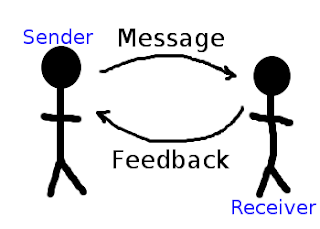Before we start talking about training on various skills the first thing that comes to our mind when we say training, we think communication. So today on this training blog I will discuss with you communication training. Since it is a vast and dynamic area of training, we would have to take one step at a time. I will discuss few concepts and then move on to the next step.
First lets talk about the basic things so that we have a clearer understanding of this word "communication".
1. What is the difference between speech and communication?
2. What is the difference between listen and hear?
3. What does communication mean?
Let's look at the first question. Speech is when a human being vocalizes his/her feelings, expressions or thoughts. One can speak even without an audience, example, practicing a speech in front of the mirror. The speaker is talking but there is a possibility of no one listening to it. Communication, on the other hand uses speech as one of its components. It is a much wider concept.
Now the second question. According to Wikipedia "Hearing, auditory perception, or audition[1] is the ability to perceive sound by detecting vibrations,[2] changes in the pressure of the surrounding medium through time, through an organ such as the ear." In simple words whatever sound is made in your environment and that you are able to hear it through your ears is called hearing.
Listening on the other hand is defined as "Listening is often confused with hearing. While hearing is a biological process that can be scientifically explained, listening is a psychological phenomenon. Listening is psychological because it requires internal contextual contemplation of the sound waves. This internalization requires the use of social connotation which implies bias. According to philosopher Roland Barthes, listening can be understood on three levels: alerting, deciphering, and an understanding of how the sound is produced and how the sound affects the listener". Listening involves hearing, understanding and analyzing. The listener has to go beyond what the speaker is saying, he/she needs to asses the tone, choice of words and various other things. One of the best examples to help you differentiate between the two is when you drive while the music is playing in car. You hear the traffic noise but if a song gets you attention, then you start listening to it. If a cop stops you then the song is what you hear and you listen to what the cop is saying to you.
In order to communicate well, one needs to be an effective listener. We will discuss various points in finer details as to help you become or train others to become an effective listener.
Now we come to the most important question what is communication?
Wikipedia says "
Communication (from Latin "communis", meaning to share) is the activity of conveying information through the exchange of thoughts, messages, or information, as by speech, visuals, signals, writing, or behavior.
Communication requires a sender, a message, and a recipient, although the receiver need not be present or aware of the sender's intent to communicate at the time of communication; thus communication can occur across vast distances in time and space.
Some of the words used in this definition can be understood here:
- Message: The thoughts or ideas the speaker is trying to communicate.
- Sender: He/she is the speaker.
- Recipient: The listener.
So the speaker needs to be an effective speaker who uses the right words, tone etc with respect to what he/she is saying. We will be discussing the points of how to be a good communicator in the later stages.
Hopefully this post will help you understand the basic concepts of communication clearly.
"

This comment has been removed by the author.
ReplyDeleteVery informative! Thanks
ReplyDeleteWaiting for your further insight on how to be a good communicator in the later stages. :)
ReplyDelete